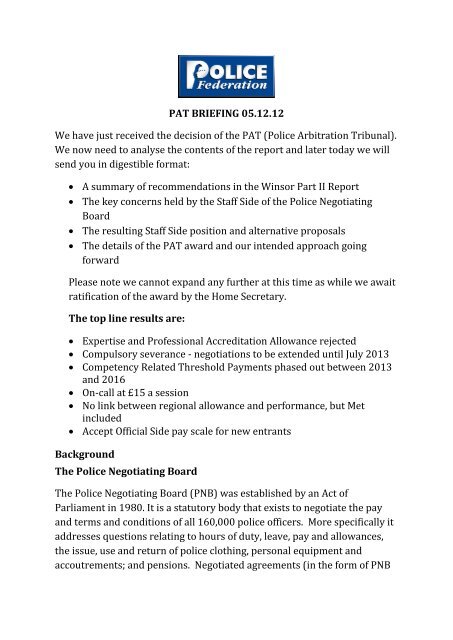PAT award - Police Federation
PAT award - Police Federation
PAT award - Police Federation
You also want an ePaper? Increase the reach of your titles
YUMPU automatically turns print PDFs into web optimized ePapers that Google loves.
<strong>PAT</strong> BRIEFING 05.12.12<br />
We have just received the decision of the <strong>PAT</strong> (<strong>Police</strong> Arbitration Tribunal).<br />
We now need to analyse the contents of the report and later today we will<br />
send you in digestible format:<br />
• A summary of recommendations in the Winsor Part II Report<br />
• The key concerns held by the Staff Side of the <strong>Police</strong> Negotiating<br />
Board<br />
• The resulting Staff Side position and alternative proposals<br />
• The details of the <strong>PAT</strong> <strong>award</strong> and our intended approach going<br />
forward<br />
Please note we cannot expand any further at this time as while we await<br />
ratification of the <strong>award</strong> by the Home Secretary.<br />
The top line results are:<br />
• Expertise and Professional Accreditation Allowance rejected<br />
• Compulsory severance - negotiations to be extended until July 2013<br />
• Competency Related Threshold Payments phased out between 2013<br />
and 2016<br />
• On-call at £15 a session<br />
• No link between regional allowance and performance, but Met<br />
included<br />
• Accept Official Side pay scale for new entrants<br />
Background<br />
The <strong>Police</strong> Negotiating Board<br />
The <strong>Police</strong> Negotiating Board (PNB) was established by an Act of<br />
Parliament in 1980. It is a statutory body that exists to negotiate the pay<br />
and terms and conditions of all 160,000 police officers. More specifically it<br />
addresses questions relating to hours of duty, leave, pay and allowances,<br />
the issue, use and return of police clothing, personal equipment and<br />
accoutrements; and pensions. Negotiated agreements (in the form of PNB
circulars) are recommended to the Secretaries of State and to Scottish<br />
Ministers.<br />
<strong>Police</strong> officers’ terms and conditions are detailed in statutory regulations<br />
and determinations. Once a PNB agreement is ratified by the Home<br />
Secretary (in England and Wales) revised regulations are submitted for the<br />
approval of Parliament, following which they come into force and are<br />
legally binding. Revised determinations are issued by the Home Office.<br />
The Board consists of an Official Side and a Staff Side. The Official Side is<br />
tripartite: consisting of representatives of the Secretaries of State, <strong>Police</strong><br />
and Crime Commissioners and chief police officers (ACPO/ACPOS). The<br />
Staff Side consists of the <strong>Police</strong> <strong>Federation</strong>s, the Superintendent<br />
Associations and the Chief <strong>Police</strong> Officers’ Staff Associations. Either Side<br />
can introduce an issue for discussion usually in the form of a Staff Side<br />
claim or an Official Side proposal.<br />
The Board meets as appropriate (usually quarterly), to consider matters<br />
affecting all ranks; and the three standing committees: the Chief Officers’<br />
Committee, the Superintendents’ Committee and the Federated Ranks’<br />
Committee, consider matters affecting each respective rank.<br />
The PNB has an Independent Chair and Deputy Chair appointed by the<br />
Prime Minister and is serviced by an Independent Secretariat provided by<br />
central government. The Independent Secretariat, in addition to servicing<br />
the Board and committees, is responsible for researching and assessing<br />
data on pay and all other matters of concern to the Board and its<br />
committees. The PNB can also provide assistance to parties in dispute<br />
locally either in the form of agreed guidance and/or local conciliation.<br />
Should a failure to agree be registered by either Side of the PNB then the<br />
matter can be referred to conciliation and (save pensions) arbitration.<br />
The Home Secretary, the Secretary of State for Northern Ireland and<br />
Scottish Ministers each have the power the direct the PNB to consider and<br />
reach agreement on such matters as they may specify within a timeframe of<br />
their choosing for matters of serious national importance to the police<br />
service. Where agreement cannot be reached by a set deadline the matter<br />
can be referred to the <strong>PAT</strong> for arbitration.
What is the <strong>Police</strong> Arbitration Tribunal (<strong>PAT</strong>)?<br />
<strong>Police</strong> Officers in the United Kingdom are prohibited by statute from the<br />
being able to take industrial action. Under the Constitution of the <strong>Police</strong><br />
Negotiating Board, therefore, matters on which no agreement can be<br />
reached, and which cannot be resolved by conciliation, may be referred by<br />
either Side to arbitration. Pension matters are non-negotiable and are only<br />
influenced by consultation.<br />
Arbitration is carried out by a standing <strong>Police</strong> Arbitration Tribunal (<strong>PAT</strong>),<br />
which operates under the auspices of the Advisory, Conciliation and<br />
Arbitration Service (ACAS). The <strong>PAT</strong> consists of three arbitrators<br />
appointed by the Prime Minister.<br />
Before referral to the <strong>PAT</strong>, the Sides agree the terms of reference of any<br />
dispute. Any decision of the arbitrators is treated as though it were an<br />
agreement of the <strong>Police</strong> Negotiating Board.<br />
Why were these issues referred to the <strong>Police</strong> Arbitration Tribunal?<br />
When the two sides of the <strong>Police</strong> Negotiating Board met on 24 th July 2012<br />
the Staff Side brought to the table alternative offers, flexibility and<br />
solutions on the Winsor Part II recommendations. For more details on Staff<br />
Side’s submission please visit the <strong>Police</strong> <strong>Federation</strong> website:<br />
http://www.polfed.org/PR_Ian_Rennie_Statement_to_the_PNB_full_board_<br />
240712.pdf<br />
The two sides (The Staff Side and Official Side) failed to agree on a number<br />
of key points including:<br />
• Compulsory severance<br />
• Pay reform (starting salaries, resuming incremental progression,<br />
Competence Related Threshold Payments and Expertise and<br />
Professional Accreditation Allowance)<br />
• Overtime<br />
• On-call<br />
• Regional allowances<br />
These matters were then referred to the <strong>Police</strong> Arbitration Tribunal. Each<br />
Side then presented their evidence on the 18 th and 31 st October.
















